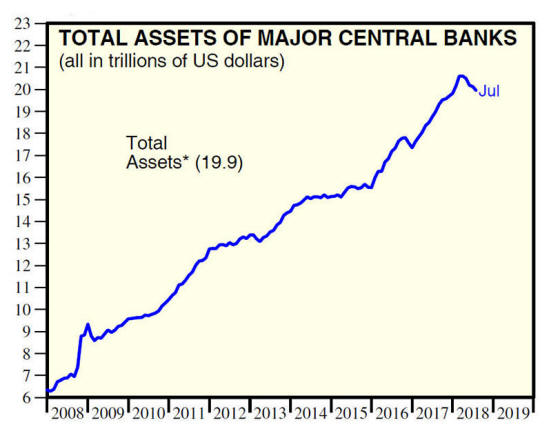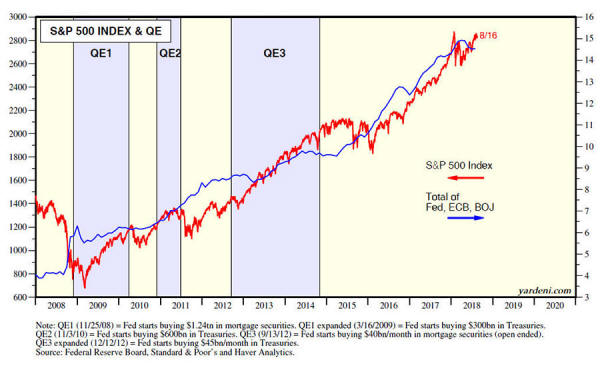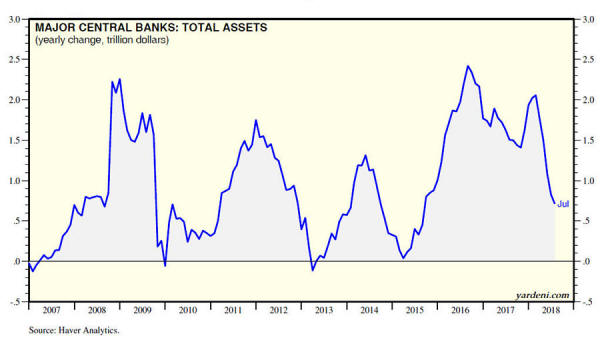|

by Chris Martenson
August 17,
2018
from
PeakProsperity Website

And how do things
usually work out for the rat?
There are ample warning signs that another serious financial
crisis is on the way.
These warning signs are being soundly ignored by the majority,
though. Perhaps understandably so.
After 10 years of near-constant central bank interventions
to prop up markets and make stocks, bonds and real estate rise in
price - while also simultaneously hammering commodities to mask the
inflationary impact of their money printing from the masses -
it's difficult to imagine that "they" will allow markets to ever
fall again.
This is known as the "central bank put":
whenever the markets
begin to teeter, the central banks will step in to
prop/nudge/cajole the markets back towards the "correct"
direction, which is always: Up...!
It's easy in retrospect
to see how the central banks have become caught in this trap of
their own making, where they're now responsible for supporting all
the markets all the time.
The 2008 crisis really spooked
them. Hence their massive money printing spree to "rescue" the
system.
But instead of admitting that Great Financial Crisis (GFC)
was the logical result of flawed policies implemented after the 2000
Dot-Com crash (which, in turn, was the result of flawed policies
pursued in the 1990's), the central banks decided after 2008 to
double down on their bets - implementing even worse policies.
The
Largest-Ever Monetary Experiment In Human History
It's not hyperbole to say that the monetary experiment conducted
over the past ten years by the world's leading central banks (and
its resulting social and political ramifications) is the
largest-ever in human history:

Source
This global flood of freshly-printed 'thin air' money has no
parallel in the historical records.
All around the world,
each of us is part of a grand experiment being conducted without the
benefits of either prior experience or controls. Its outcome will be
binary: either super-great or spectacularly awful.
If the former, then no worries. We'll just continue to borrow and
spend in ever-greater amounts - forever. Perpetual prosperity for
everyone!
But if things hit a breaking point, then you had better be prepared
for some truly bad times.
Excessive money printing leads to the destruction of currency.
Fiat money like,
...is a social contract
and has an associated set of related agreements.
When that contract and
those agreements are broken by reckless expansion of the currency
base, things fall apart fast. We need look no further than
current-day Venezuela to understand
that.
It's important to remember that money - whether physical cash or in
digital form, stocks, or bonds - is just a claim on real wealth.
Real wealth is: land,
clothes, food, oil… you know, 'real' things...
We expect that our cash
will be able to buy us the real things we want when we want them.
We trust that our stocks
give us an ownership stake in a real company producing real things
for real profits. We rely on our bonds being re-paid in the future
along with interest; but if not, we expect that our bond becomes a
claim on valuable collateral.
Ideally, the money supply and the amount of real wealth should exist
in balance. As money is a claim on "stuff", as economic output (i.e.
"stuff") increases, then so should the claims. And vice-versa during
periods of economic contraction.
But what happens when the claims start to far outweigh the 'real'
"stuff"? That's when things get precarious...
Note how dramatically the claims represented by just the
S&P 500 index alone have quadrupled
since the start of 2009, driven by the central banks' quantitative
easing programs:

Source
The flood of money unleashed by
QE didn't result in vast amounts of
new actual wealth being created (i.e. greater productive output per
capita).
But it did result in
grotesquely-inflated financial asset prices that have helped to
create the most profound wealth and income inequality seen in our
lifetime (perhaps ever).
The Many Sins
of the Central Banks
The list of central bank-induced injustices is long.
It reads like the rap
sheet of a virulent psychopath:
-
$trillions looted
from savers and handed to the big banks and leveraged
speculators
-
ruined pensions
-
shattered
retirement dreams for millions
-
record amounts of
debt in every corner of the global economy
-
an increasingly
unaffordable cost of living for everyone but the elite 1%...
"But we had
to save the system!" cry the central bankers in their
defense.
Even if that were the
case (and I dispute whether the world is really better off for
having saved Citibank et al.), that rescue should have ended back in
mid-2009, at the latest.
But instead, the central banks ramped up their wanton ways in the
years since the GFC.
Did you know that their
largest-ever printing spree happened over the past two years? (2016
to 2017):

Source
The bigger the printing spree the bigger the fundamental
distortions.
In such a world, up
becomes down, black becomes white, and right becomes wrong. All of
which means that fundamental analysis, has been all but useless as a
predictor of prices.
All that has mattered is
the answer to the question:
"How much will the
central banks print next...?"
In such an environment,
there's no room for investors.
It forces all of us to
become speculators, trying to predict what a small cabal of bankers
are thinking.
But among their very worst offenses has been the manipulation of
sentiment. The prices of financial assets and commodities have
become political and propaganda tools, which means that nothing can
be left to chance.
All prices have to send
the "right" signals at all times, in the same way that certain news
outlets pump a point of view endlessly. Repetition creates its own
reality.
Because of the increasingly frequent (probably daily), interventions
by central banks and their proxies, the financial markets have
become ""markets"". They no longer provide us with any useful
signals about the future or about the current health of the economy.
Instead, they only tell us what the authorities want us to hear.
To them, all that matters is strength and stability.
As long as those conditions continue to be met for stocks, bonds and
real estate prices, most people are content to let things ride and
not probe too deeply.
But when this scam comes to its inevitable end:
the crash will be
spectacular when it arrives.
This reckoning is already
way overdue.
At this point, we find
ourselves in the odd position of rooting for it to happen soon, as
the potential energy in the system builds with every passing day.
Our worry is that if the
crash is delayed for much longer, its resulting carnage will be so
large that it will be unsurvivable.
And while we mean that in the figurative sense for people's
portfolios, it's possible that the crash could become literally
unsurvivable if the political "solution" to deflect blame away from
the the central banks and their DC partners-in-crime is a kinetic
war.
When viewed in that light, America's histrionic attempts to
demonize Russia over the past
few years begin to make frighteningly more sense...
It's Time to
'Talk Turkey'
We've been vocal of late about the numerous signs that another great
financial crisis is building.
The gut-punch Turkey
hit global markets with this week is just one example.
Yes, it will be painful
to crash from here.
But once the needed
correction is underway, we'll have the opportunity to make the best
of it. We can pick up the pieces and begin building towards a future
we can all believe in.
Yes, there's no avoiding the pain of taking our lumps for the the
past mistakes we've made. But we don't have to compound our misery
by continuing to do more of exactly what got us into this mess in
the first place. We simply need the courage to face the
psychological burden of admitting to our prior failings.
That's doable...
It all starts with being honest with ourselves.
Look, we all know the world is finite:
Infinite economic growth on a
finite planet is an impossibility...
We have all the data we need to
make that conclusion. Every passing day where we pretend that's
somehow untrue or avoidable makes the eventual adjustment that much
more wrenching.
It's an intellectually simple exercise to conduct. But an
emotionally impossible task for those whose internal belief systems
would be hopelessly compromised by allowing that logic to penetrate
their world view.
And so the future will be represented by two sorts of people:
I sincerely hope that
you're not among those deterred from preparing by the last gleaming
of today's glittering stock prices.
We're going to need as
many prepared people as possible in the coming future. And we may
need them soon. The severe recent deterioration in the Emerging
Markets threatens a contagion that could well start the next crisis.
Turkey is currently in a major currency crisis threatening to
metastasize into a full-blown sovereign debt crisis.
Defaults there will spill
over into Europe's banking system (which has made loads of shaky
loans to Turkey), and from there cause domino effects throughout the
rest of the world.
But Turkey isn't the weakest or the most worrying country faltering:
Italy is stumbling,
as is Brazil, and even China...
But Asia ex-China is the
real powderkeg:
their unserviceable
debts dwarf everybody else.
|





